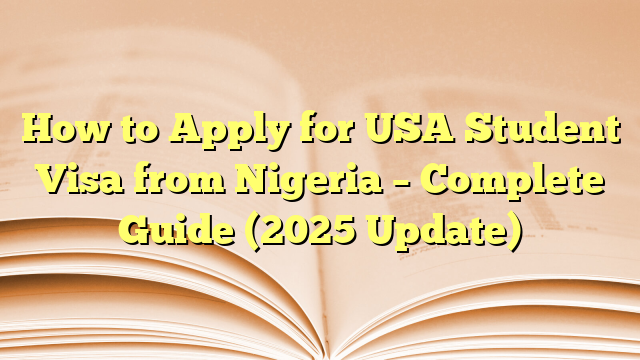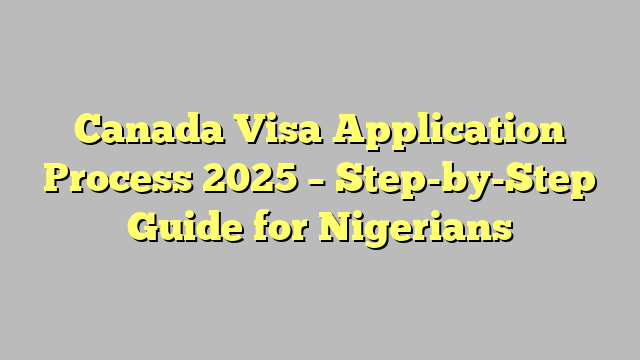The United States remains one of the most sought-after destinations for Nigerian students pursuing higher education abroad. With its world-class universities, cultural diversity, and extensive career opportunities, studying in the USA is a dream for many. However, the process of securing a student visa (commonly known as an F-1 Visa) can be challenging without the right guidance.
This detailed guide provides all the necessary information you need to apply for a USA student visa from Nigeria successfully in 2025. From understanding eligibility requirements to preparing for your visa interview, this article will walk you through each step.
What Is a USA Student Visa?
A USA student visa is a non-immigrant visa that allows foreign students to enter the United States to attend accredited academic institutions. The most common student visa is the F-1 Visa, which is required for full-time study in the U.S.
Other types include:
- M-1 Visa – for vocational and technical training
- J-1 Visa – for exchange visitors, including scholars and interns
For most Nigerian students, the F-1 Visa is the primary option.
Step-by-Step Guide to Apply for a USA Student Visa from Nigeria
1. Gain Admission into a SEVP-Approved School
Before applying for a visa, you must first apply and be accepted by a U.S. school certified by the Student and Exchange Visitor Program (SEVP). You can check the list of SEVP-certified schools at studyinthestates.dhs.gov.
Tips:
- Apply early (at least 6–12 months before your desired semester)
- Prepare academic records, transcripts, and standardized test scores (e.g., TOEFL, IELTS, SAT, GRE)
2. Receive Form I-20
Once accepted, the school will send you a Form I-20, which is your Certificate of Eligibility for Nonimmigrant Student Status.
Ensure all information is accurate:
- Name (matches passport)
- School and program information
- SEVIS ID (a unique number you’ll use for the visa application)
3. Pay the SEVIS I-901 Fee
Before scheduling your visa interview, pay the SEVIS fee ($350 for F-1 Visa applicants) at fmjfee.com.
Keep the receipt – you’ll need it for your visa appointment.
4. Complete the DS-160 Visa Application Form
Visit ceac.state.gov to complete the DS-160 Form, the official U.S. visa application.
Details required:
- Personal info (passport, address, contact)
- Travel history
- Intended stay in the U.S.
- SEVIS ID and school information
- Security and background checks
After submission, print the DS-160 confirmation page with the barcode.
5. Pay the Visa Application Fee
The visa fee for Nigerian applicants is $185 (as of 2025). Pay online or at designated U.S. visa fee collection banks in Nigeria (e.g., GTBank).
Retain the receipt as proof of payment.
6. Schedule Visa Appointment
You must schedule two appointments:
- Biometric Appointment at the Visa Application Center (VAC)
- Interview Appointment at the U.S. Embassy or Consulate
Visit the U.S. visa scheduling website for Nigeria: www.ustraveldocs.com/ng
Choose either:
- U.S. Embassy in Abuja, or
- U.S. Consulate in Lagos
7. Prepare Required Documents
Here’s what to take for your interview:
- Valid passport (must be valid for at least 6 months beyond intended stay)
- DS-160 confirmation page
- Visa fee receipt
- I-20 form
- SEVIS fee payment receipt
- Admission letter from school
- Academic transcripts and certificates
- Standardized test scores (TOEFL, IELTS, SAT, GRE)
- Proof of financial support (bank statements, sponsor’s affidavit, scholarship letters)
- Passport-sized photograph (as per U.S. visa photo specifications)
- Ties to Nigeria (e.g., employment letter, family ties)
8. Attend the Visa Interview
Dress formally and arrive early. Be confident, honest, and direct when answering questions.
Common visa interview questions:
- Why do you want to study in the USA?
- Why did you choose this university?
- Who is sponsoring your education?
- What will you do after graduation?
- Do you have family in the USA?
The interview typically lasts 5–10 minutes.
Financial Proof for USA Student Visa
You must demonstrate that you can afford tuition and living expenses without working illegally in the U.S.
Acceptable documents include:
- Personal/sponsor bank statements
- Affidavit of support
- Letter of financial sponsorship
- Scholarship award letters
- Pay slips, employment letters
As of 2025, the average cost of living for international students in the U.S. is $10,000–$15,000 per year, in addition to tuition fees.
Reasons for USA Student Visa Rejection
Visa officers may deny a visa due to:
- Inadequate financial proof
- Suspicion of immigration intent
- Unclear academic plans
- Poor performance during interview
- Fake documents or inconsistencies
Tip: If denied, you can reapply with improved documents and a better strategy.
After Visa Approval – What Next?
Once your F-1 Visa is approved:
- You’ll receive your passport with the visa stamped inside
- You may travel to the U.S. up to 30 days before the program start date on your I-20
- Pack your documents, prepare finances, and plan your travel
Can You Work with an F-1 Visa?
Yes, but with restrictions:
- On-campus jobs: Allowed up to 20 hours/week during school and 40 hours/week during breaks
- Off-campus employment (CPT/OPT): Requires school approval and sometimes USCIS authorization
Converting Student Visa to Work Visa After Graduation
Graduates on an F-1 Visa may be eligible for Optional Practical Training (OPT) or H-1B Work Visa.
- OPT allows up to 12 months (or 36 months for STEM fields) of work
- H-1B is a skilled worker visa that requires employer sponsorship
Many Nigerian students use this path to eventually apply for permanent residency (Green Card).
Tips for Nigerian Applicants
- Start the process early (ideally 6–12 months ahead)
- Avoid fake agents or fraudulent documents
- Keep all receipts and paperwork organized
- Be honest and confident during your interview
- Prepare a clear academic and career plan
Final Thoughts
Applying for a USA student visa from Nigeria may seem like a daunting process, but with the right information and preparation, it is absolutely achievable. Thousands of Nigerian students successfully migrate to the U.S. for studies every year. By following the steps outlined in this guide, staying organized, and presenting a strong case during your interview, you can secure your F-1 visa and begin your educational journey in the United States.
If you’re serious about studying in the U.S., start preparing now, and don’t hesitate to reach out to your university’s international student office for support.






